CSotD: With Best Intentions
Skip to comments
Al Goodwyn (Creators) sets the tone for today’s conversation with what seems a damp squib — that is, a firecracker that fizzles. Contrast it to this Lisa Benson cartoon:
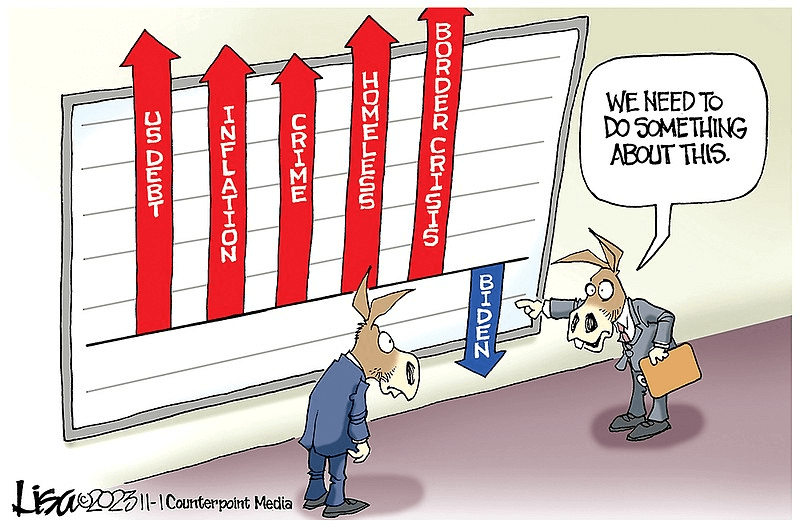
Benson’s cartoon misfires rather that fizzles: She’s simply wrong that crime and inflation are increasing, and the polls on Biden are argumentative rather than definite. Still, her intentions are clear.
Goodwyn’s cartoon is based on the old story of blind men who each examine a different part of an elephant and come up with different, and incorrect, ideas about the animal. But his point is unclear: Is he saying that they all come to the same false conclusion for different reasons, or that the Republicans are in such lockstep that, wherever you examine them, the correct conclusion is obvious?
Benson may be arguing from false premises, but, whether you agree or not, at least you can tell her meaning, and even an infuriating cartoon opens some discussion.
I wouldn’t normally single out a damp squib. The usual response is to shrug and move on, knowing that he’ll be back with something better tomorrow.
But the overall concept of Good Intentions matters in times of crisis, and we’re juggling enough crises at the moment that it needs to be at the forefront.

Steve Bell‘s misfire on a cartoon has erupted into a great deal of bloviation on the topic of editorial independence, but my colleague DD Degg has tracked down a reasonable interview in which Bell says he had already had bad relations with his editors and was likely sacked not for the cartoon itself but for his public disagreement over the spiking of his piece.
It’s important reading but I fear it’s too late to lock the barn door, the horse having bolted several days ago. Still you should read it, and be sure to click the link to the interview.
When I was in college, I took several fiction-writing classes in which we submitted our stories anonymously and then had to sit back and listen to our classmates discuss them, only responding when the conversation had ended.
The principle was that what you intend needs to be in the work, because you can’t follow everyone around looking over their shoulders and explaining what you meant to say.
That’s an excellent principle. One of the best.
Juxtaposition of the F’rinstance
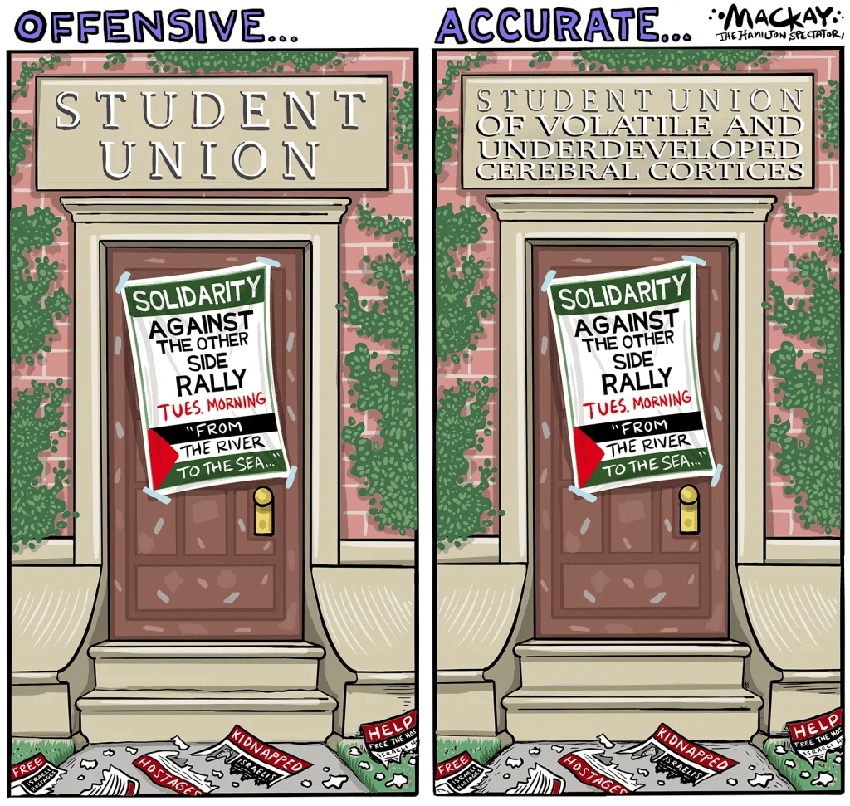

MacKay echoes something I’ve said several times on this topic: Young people are prone to saying extreme and foolish things, but I sense he’s criticizing the idea that they should be let off the hook because their brains are still in developmental flux.
Varvel offers no excuses, and declares a naive loudmouth to be a hateful dedicated young Hitler.
I agree with MacKay’s apparent point that the excessive statements and actions are understandable without being forgivable, while Varvel’s cartoon is more readily parsed, though it does prompt the question of how this couple raised their child that made him so vulnerable to extremist notions.

When I was in college, Father Hesburgh issued a famous “15 Minute Warning” that was praised as tough by the conservative press and denounced by a handful of campus hard-liners, but seemed reasonable to people between those extremes.
He upheld the right to demonstrate, but not to interfere with others’ rights. The principle was tested at a demonstration when Dow and the CIA were both interviewing at the placement bureau, and a group of demonstrators blocked the door rather than just holding a vigil of protest.
Campus officials screwed up by taking ID cards not just from those obstructing the doorway but also from spectators, including the Student Body VP who was there to monitor the event.
Thus proving that a policy is only as good as the people who enforce it.
Still, it does seem colleges should be able to uphold free speech, even offensive free speech, without tolerating vandalism, assault or harassment of individuals, as long as they don’t mind offending both ends of the spectrum.
However, to return to the main point, it’s hard to draw a cartoon that does all that. Subtle distinctions are difficult to capture in a single panel.
Juxtaposition of the Day #2


No subtle distinctions here, as world leaders debate the need for a standdown in Gaza and Brown and Brookes clearly disagree over the prospects.
Brown’s point is that the people of Gaza need food, water and medical aid, and that speeches from British leaders, or, for that matter, American leaders and UN administrators, are a poor stand-in for those supplies.
Brookes, meanwhile, points out that you can’t expect rules in asymmetric warfare, a fact long since proven in Algeria, in Indochina, in Iraq, in Afghanistan.
But it’s becoming clear that doing nothing also bears its own moral burden, given that, in 1939, multiple nations turned back the M.S. St. Louis, forcing its refugees to return to Nazi Germany.
I know thy works, that thou art neither cold nor hot: I would thou wert cold or hot. So then because thou art lukewarm, and neither cold nor hot, I will spue thee out of my mouth. — Rev. 3:15-16
Juxtaposition of the Day, Domestic Version
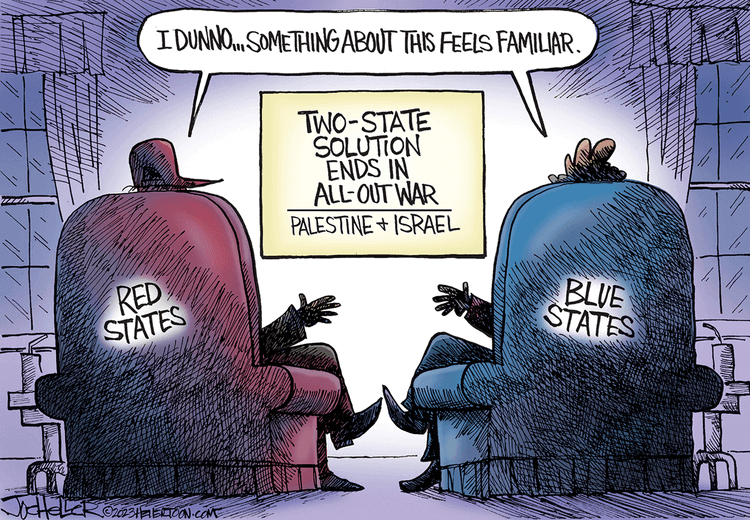
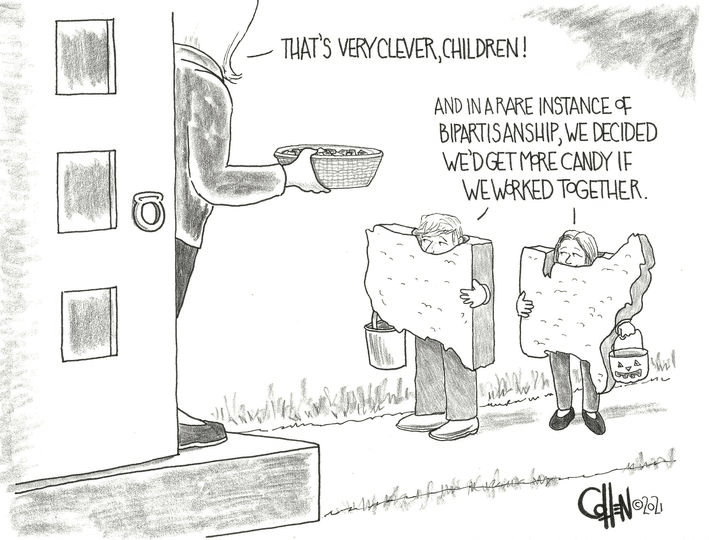
We’ve got our own problem here in the United States, though both these cartoons miss a vital point or two.
Heller seems to think Israel and Palestine have tried the Two-State Solution, which they have not. Borders have been shifting since 1948, sometimes through war and sometimes through gradual infiltration, and very largely through empty promises and unheeded agreements.
Like belling the cat, everyone seems to agree that the Two-State Solution is a good idea, but nobody wants to be the one to make it happen.
Which brings us to Cohen’s Halloween cartoon, in which he understandably demonstrates a divided America by cutting the map in half, which is graphically coherent but doesn’t resemble the reality, in which our divisions are scattered, and, no, not into the neat categories of Red States and Blue States that Heller borrows.
Sometimes a cartoon can be clear in its intentions only by ignoring pesky realities.
Juxtaposition of the Masters

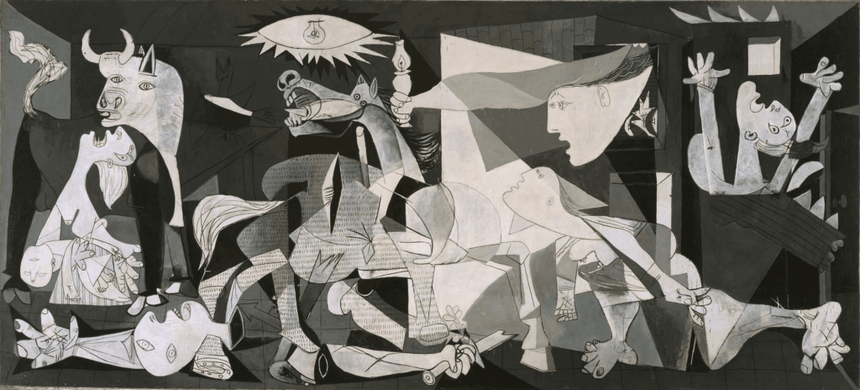
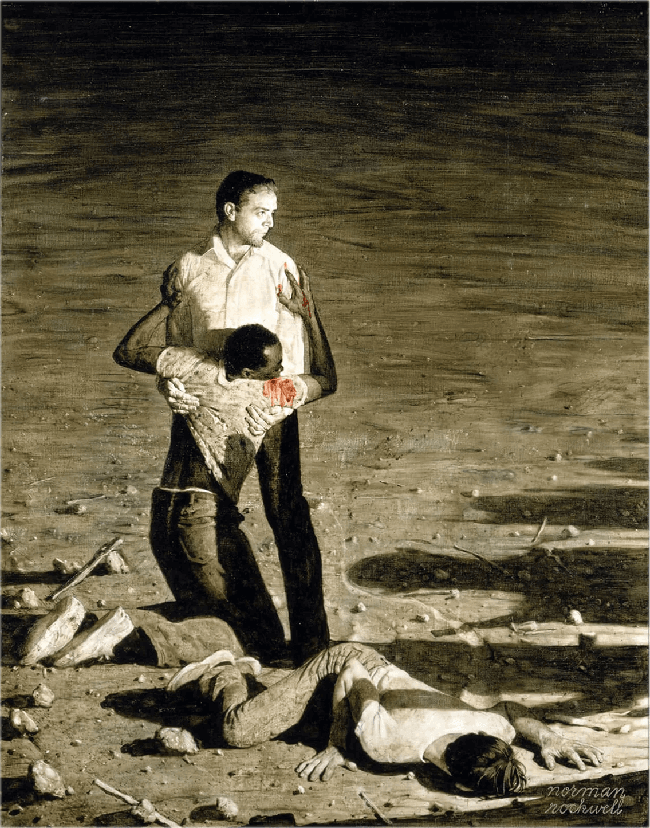
It’s up to artists to decide between reality and metaphor, and to make their intentions clear.
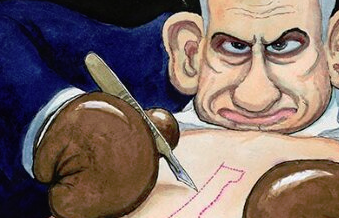
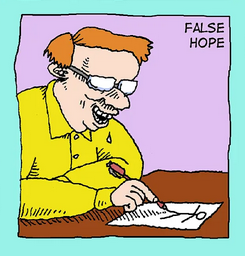
Comments 5
Comments are closed.